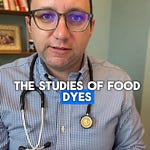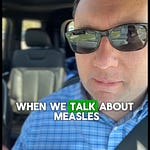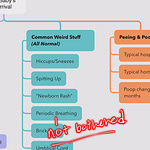Measles: What You Need to Know About the Current Outbreaks 🦠💡
Measles is making headlines again, and as a pediatrician, I want to walk you through what’s important—without fear, guilt, or coercion. My approach is always to give you the facts so you can make informed decisions for your family.
Here’s what you need to know about measles and why it’s more than just a fever & rash.
Measles is one of the most contagious viruses
Compared to flu or COVID, measles spreads 7-10x more easily through the air. The virus can linger in a room for up to two hours after an infected person has left. 😷
Most people are protected—thanks to immunity
✔️ The measles vaccine provides lifelong immunity for most people.
✔️ Those born before the 1960s likely had measles and are immune.
✔️ But babies under 12 months are too young to be vaccinated, which makes outbreaks risky for them. 🍼
1️⃣ Hospitalization rates are high 🏥
Measles isn’t just a childhood rash illness. 40% of children in recent U.S. outbreaks have been hospitalized.
💔 Common complications include:
✅ Pneumonia (a leading cause of measles deaths)
✅ Severe dehydration requiring IV fluids
✅ Difficulty breathing and secondary infections
2️⃣ Measles can erase your immune memory 🧠🚨
A lesser-known but serious effect is immune amnesia—measles can wipe out your body’s memory of past infections.
📉 This means:
🔹 Your immune system may "forget" how to fight off illnesses you already had.
🔹 Kids may become vulnerable to infections they had already built defenses against.
3️⃣ SSPE: A rare but devastating long-term complication 🧠💀
Subacute sclerosing panencephalitis (SSPE) is a fatal, delayed brain disease that can appear years after a measles infection—especially in children who had measles under age 2.
⚠️ Symptoms can start years later with seizures, muscle spasms, and neurological decline, eventually leading to coma and death.
⚠️ While rare (about 1 in 10,000 measles cases), it’s tragic & fatal when it occurs.
4️⃣ Risks to pregnant women and unborn babies 🤰❌
For pregnant moms who contract measles, risks include:
⚠️ Pneumonia and hospitalization
⚠️ Miscarriage, stillbirth, or preterm birth
⚠️ Congenital measles syndrome (leading to lifelong developmental delays and seizures in the baby)
What You Can Do 🛡️
✔️ Know your immunity status—vaccination protects against measles for life.
✔️ Protect vulnerable populations, especially babies under 12 months.
✔️ Stay informed and talk to your doctor if you have questions.
The goal here isn’t to scare anyone—but to make sure parents have the full picture of why measles is taken seriously.
If this was helpful, leave a comment or share this with another parent! 💬📢
Full transcript
Measles: What Every Parent Should Know
Measles outbreaks are back in the headlines, and if you’ve been following the news, you might be wondering: How serious is it? What do I need to know?
As a pediatrician, my goal is to give you clear, factual, and practical information—without fear, guilt, or pressure. I want you to understand what measles is, why outbreaks matter, and how to make informed decisions for your family.
Measles Is Extremely Contagious
Let’s start with how measles spreads. If you’re familiar with flu or COVID, you know they are highly contagious. Measles, however, is in another league.
The measles virus is 7-10 times more contagious than flu or COVID. It spreads through airborne particles, meaning you can catch it just by being in the same room as someone who is infected—even if they’ve already left. In fact, the virus can linger in the air for up to two hours after an infected person has coughed or sneezed.
This makes measles particularly risky in places like daycares, schools, and public spaces where young children are present. If an unvaccinated person walks into a room where someone with measles recently was, there’s a 90% chance they will get infected.
Most People Are Protected—But Babies Are at Risk
Thankfully, most people are immune to measles—either because they’ve been vaccinated or, in the case of older generations, because they had measles as a child.
✔️ The measles vaccine provides lifelong immunity for most people.
✔️ If you were born before the 1960s, you likely had measles as a child and are immune.
✔️ Babies under 12 months old are too young to be vaccinated, making them especially vulnerable in an outbreak.
While overall vaccination rates are still high, small pockets of lower vaccination rates create an opportunity for the virus to spread. That’s why outbreaks tend to happen in specific communities rather than nationwide.
Measles Hospitalization Rates Are High
Many people think of measles like chickenpox—a childhood illness that’s painful, itchy annoying but mostly mild. However, measles is much more dangerous.
In recent U.S. outbreaks, 40% of children who caught measles ended up in the hospital. That’s a staggering number compared to flu or COVID hospitalization rates.
The main reasons children with measles require hospitalization include:
Pneumonia, which is one of the leading causes of measles-related deaths.
Severe dehydration, because the illness can cause prolonged high fever, poor appetite, and diarrhea.
Difficulty breathing due to complications like inflammation of the airways.
To put it in perspective: If ten unvaccinated babies in a daycare are exposed to measles, at least four of them will end up in the hospital. That’s a much higher hospitalization rate than flu or RSV.
Measles Can Erase Your Immune Memory
One of the most overlooked dangers of measles is immune amnesia—a phenomenon where the virus wipes out your body’s memory of past infections.
Here’s how your immune system works: Every time you fight off an illness—whether it’s a cold, flu, or stomach bug—your body remembers how to fight it in the future. This is why adults typically get sick less often than young kids.
However, when someone gets measles, the virus kills off immune cells that store this information. That means your body may "forget" how to fight off infections you’ve already had, making you vulnerable to illnesses you should have been immune to.
Think of it like this: It’s as if your immune system has been reset back to zero. After recovering from measles, a child could start getting sick more often because their immune protection has been erased.
The Rare But Devastating Risk of SSPE
While most people recover from measles, there is a rare but horrific long-term complication called Subacute Sclerosing Panencephalitis (SSPE).
SSPE is a fatal brain disease that can occur years after a measles infection—especially in children who had measles under the age of two. It starts with mild symptoms like forgetfulness or clumsiness, but over time, it progresses to seizures, muscle spasms, and severe neurological decline.
Eventually, SSPE leads to coma and death.
The scariest part? There is no treatment. No cure. No way to stop it.
SSPE is rare—occurring in about 1 in 10,000 measles cases—but when it happens, it’s always fatal.
Before the measles vaccine existed, children died from SSPE regularly. Your grandparents may have had friends or classmates who seemed healthy one year but died of complications from a measles infection they had as a baby.
Risks to Pregnant Women and Unborn Babies
Pregnant moms who catch measles are at high risk for complications, including:
⚠️ Pneumonia and hospitalization
⚠️ Miscarriage, stillbirth, or preterm birth
⚠️ Congenital measles syndrome, which can cause:
Seizures
Lifelong developmental delays
Hearing and vision problems
Measles during pregnancy isn’t just dangerous for the mother—it can affect the baby for life.
Why This Matters
I don’t share this information to scare you—but to give you the full picture of why we take measles seriously.
For many parents, measles isn’t something they’ve ever had to think about because it was virtually eliminated in the U.S. for decades. But as outbreaks occur, it’s important to understand the risks and know how to protect vulnerable populations—especially babies, pregnant moms, and those with weakened immune systems.
What You Can Do
✔️ Know your immunity status. If you or your child is unvaccinated, talk to your doctor about options.
✔️ Protect vulnerable populations. If there’s a local outbreak, be mindful of where you take infants and immunocompromised family members.
✔️ Stay informed. If you have questions, ask a trusted medical professional—not just social media.
The Bottom Line: Measles is preventable and serious. Knowing the facts helps you make informed choices for your family.
If this was helpful, leave a comment or share this with another parent! 💬📢












Share this post